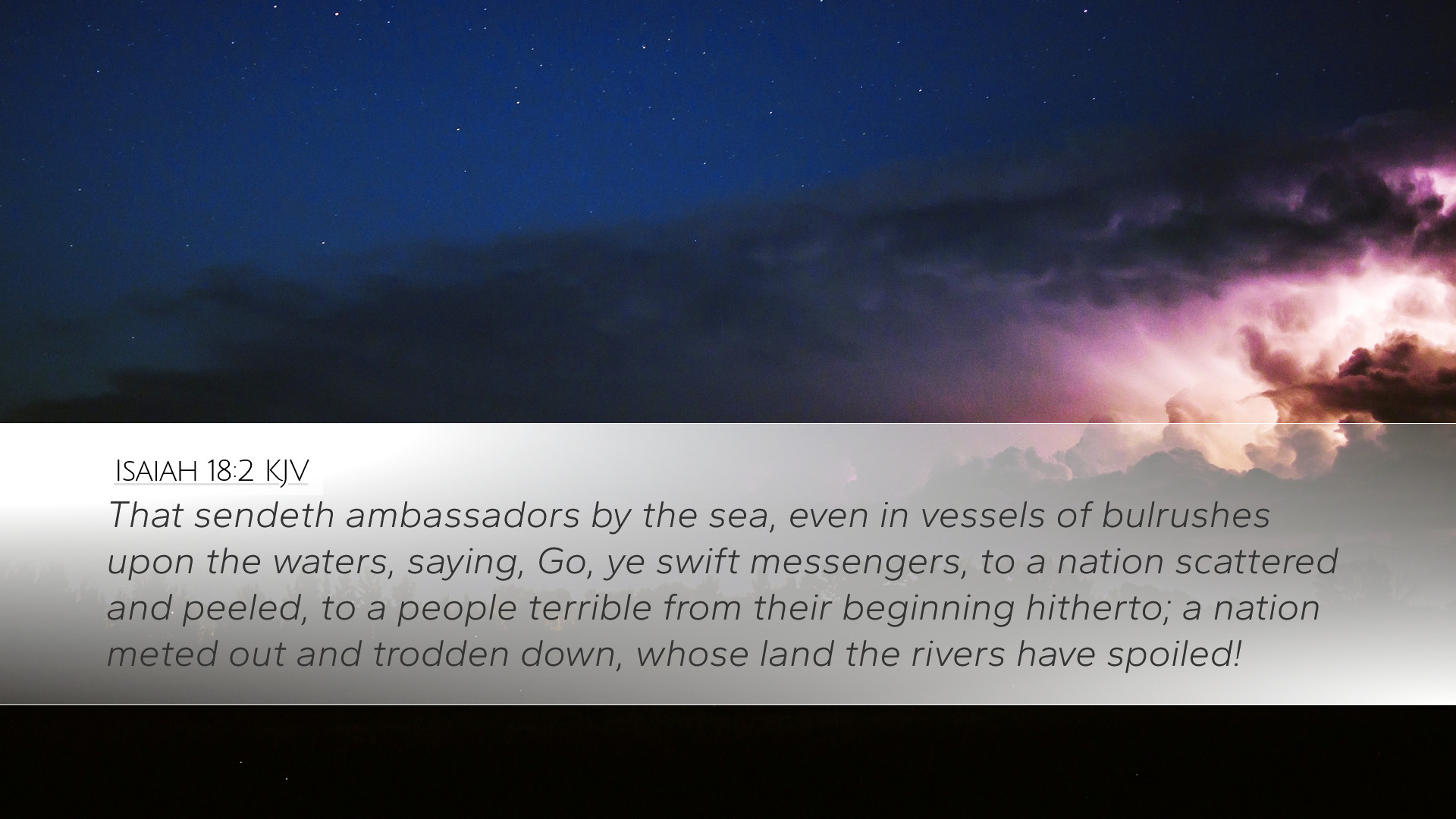Commentary on Isaiah 18:2
Isaiah 18:2 (KJV): "That sendeth ambassadors by the sea, even in vessels of bulrushes upon the waters, saying, Go, ye swift messengers, to a nation scattered and peeled, to a people terrible from their beginning hitherto; a nation meted out and trodden down, whose land the rivers have spoiled!"
Contextual Overview
The verse is set within the prophetic oracles of Isaiah, where the prophet addresses various nations. This chapter specifically speaks to Cush, often identified with modern-day Ethiopia. It is essential to understand that Isaiah's prophecies were not only directed towards Israel but also encompassed surrounding nations, reflecting God's sovereignty over all peoples.
Exegetical Insights
Ambassadors and their Purpose: The reference to "ambassadors by the sea" highlights the diplomatic missions undertaken by Cush to seek alliances or communications. Matthew Henry notes that they used "vessels of bulrushes” which indicates a humble yet practical mode of transport, illustrating both the effort and the urgency of their mission.
Characteristics of the Nation: Isaiah describes Cush as a "nation scattered and peeled." Adam Clarke explains that "peeled" may refer to the lack of protective coverings or defenses, indicating vulnerability. The term "scattered" implies a diasporic existence, perhaps referencing the dispersed tribes of Cush. The self-identity of the Cushites as a formidable nation, "terrible from their beginning," reflects both their historical prowess and their perceived might.
Historical Context
Diplomacy in the Ancient Near East: In the context of the Ancient Near East, nations frequently sent envoys to one another to negotiate treaties, alliances, or common interests. Albert Barnes emphasizes the implications of this diplomatic engagement; the mission of the Cushites appeals to the heightened political dynamics of that time, where awareness of strength and enmity was vital.
Geopolitical Significance: The geopolitical situation in ancient Judah under Ahaz, marked by threats from Assyria, necessitated alliances with neighboring nations. Isaiah's message serves as a warning against misplaced trust in alliances that could lead to their downfall.
Theological Reflections
God’s Sovereignty: Through these verses, we see a testament to God's sovereignty over all nations. Even those regarded as adversaries or nations far removed from Israel's covenantal relationship with God are under His purview. This serves to remind pastors and theologians that no power or people escapes divine notice.
The Call to Repentance: The ambassadors sent by Cush may also echo a thematic call to Israel for repentance. Just as ambassadors are sent to call upon nations, God sends messengers calling the people back to Himself. The church today must also take heed of its own calling to send forth messengers of truth.
Practical Applications
Mission and Ambassadorship: The text serves as a powerful metaphor for the call of believers to act as ambassadors for Christ in today's world. The urgency communicated in the mission of the Cushite ambassadors is mirrored in the Great Commission, where believers are entrusted with the message of the Gospel.
Cultural Engagement: In a time of cultural disarray, Isaiah 18:2 encourages engagement with the world. As Cush sought alliances, the church today is called not to establish political power but to build relationships that further the kingdom of God through love and grace.
Conclusion
Isaiah 18:2 implores readers to consider the broad implications of God's word beyond the immediate audience. Through historical context, insights into diplomatic relations, and theological reflection, we see that every nation plays a part in God's overarching plan. The church today must fulfill its role as a messenger and ambassador, embodying justice, mercy, and the prophetic call for restoration.


